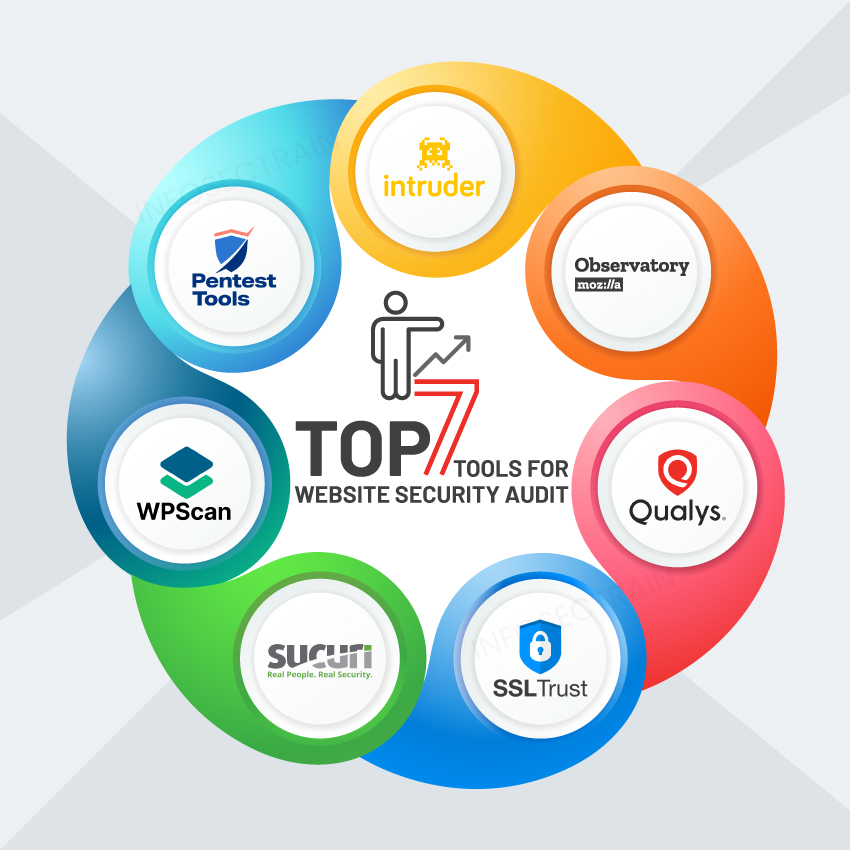Top Tools for Website Security Audit
Websites are the primary avenue used by hackers to enter the organization’s network. Due to the rapidly evolving technology, most organizations are developing websites or web apps quickly without emphasizing maintaining secure coding, which results in security holes and significant vulnerabilities in the code. Therefore, organizations of all sizes must use website security audit tools, also known as WebSec audit tools, to protect their websites or applications from hackers. These tools help a business quickly identify its website weaknesses and lessen the need for time-consuming human audits. These tools also cover the OWASP top 10 vulnerabilities, which have been identified and exploited most frequently in recent years. Both paid and unpaid tools and services are available for online website security scanning. Before knowing about the tools, you must first have a basic understanding of website security audits.

What is a Website Security Audit?
A website security audit involves examining your website and server for any current or potential vulnerabilities that hackers might use against you. It checks the security of a website core and all of your files, plugins, extensions, themes, server settings, SSL connection, etc. Web security audits also include static and dynamic code analysis, penetration testing, business logic error testing, and configuration testing.
Top 7 Tools for Website Security Audit
Several online tools, both free and paid, can be used to perform website security audits. Some of them are:

- Intruder: An online vulnerability scanner checks your servers, websites, cloud services, and applications for cyber security flaws to prevent data breaches. It identifies various vulnerabilities such as SQL injection, Cross-Site Scripting (XSS), misconfigurations, insecure server settings, sensitive data exposure, encryption flaws, unpatched vulnerabilities, and other common web application security vulnerabilities and loopholes. Also, it will scan the website’s Content Management System (CMS) for common security flaws.
- Observatory: Observatory is a free website security auditing tool offered by Mozilla. It enables website owners to examine different security-related components on their websites. It includes several features such as X-XSS protection, Content Security Policy (CSP) protection, cookies checking, HTTP Strict Transport Security (HSTS) protection, etc. It also incorporates several built-in tests from third-party platforms like SSL labs and some of its internal tests.
It divides the test results into four groups:- HTTP Observatory
- TLS Observatory
- SSH Observatory
- Third-party Tests
Each focuses on various facets of website security and provides suggestions after an assessment.
- Qualys: An essential component of website security is SSL certificates. As a result, verifying that your SSL configuration is secure before making any modifications is crucial. Qualys SSL server test is the best option for checking your website for SSL/TLS vulnerabilities and misconfigurations. It includes a comprehensive analysis of your https://URL. In addition, it simultaneously identifies the expiration date, SSL/TLS version, and rating of your website.
It includes several features for website security scanning, including threat protection, vulnerability detection, Web Application Firewall (WAF) for malware protection, continuous website monitoring, PCI compliance, safeguarding the configuration assessment with policy compliance, and web application scanning for threat detection, among others.
- SSLTrust: SSLTrust is a free website security audit tool. With the help of the SSLTrust tool, you can determine whether any website is secure enough to be accessed or not. It scans your website against many third-party tools and blacklists, including Sucuri SiteCheck, Google Safe Browsing, Comodo, Opera Blacklist, Avira, OpenPhish, etc. It tests your website against 66 different services to see whether it passes the tests or not.
- Sucuri SiteCheck: Sucuri SiteCheck is a free website scanner tool that scans sites for malware, viruses, and other malicious code. It scans your websites to identify security bugs and configuration issues. The tool checks the website blacklists status and also looks for outdated CMS, plugins, or extensions. It defends your WordPress website servers against cyberattacks by scanning them at the server level and also sends you email alerts about any suspicious activities on your website.
- WPScan: There are a number of WordPress websites that are becoming more vulnerable to attacks and hacks daily. WPScan is a WordPress vulnerability scanner tool that is created to test your WordPress-powered website. The tool offers both a free service and a premium plan. It is the most reliable and updated WordPress scanning software and runs automatically daily. It performs scanning on the WordPress website to check for vulnerabilities in the WordPress core, plugins, and themes. It has several features, including an all-in-one dashboard, two-factor authentication for increased security, WordPress username enumeration, the ability to decipher weak passwords, etc.
- Pentest-Tools: Pentest-Tools includes an advanced vulnerability scanner tool that analyzes the security of different website components. It is a complete website security audit solution that collects security data and performs infrastructure, web application, CMS, and SSL testing. It includes many features, such as scanning multiple targets simultaneously. These scanning templates may be used to run multiple tools at once to find the same threats and simple and programmatic access to the tools via API.
How can InfosecTrain Help You?
You must identify and fix your vulnerabilities as soon as possible to keep your company and clients safe from hackers. A website security audit is the best way to monitor your website’s security status.
We at InfosecTrain provide the top security certification training courses. We provide the EC-Council’s Certified Ethical Hacker certification training course, one of the most popular security courses that will enhance your understanding of crucial security basics. This course will teach you about web application attacks, including a thorough technique for web application hacking that is used to audit vulnerabilities in web applications.
TRAINING CALENDAR of Upcoming Batches For CEH v12
| Start Date | End Date | Start - End Time | Batch Type | Training Mode | Batch Status | |
|---|---|---|---|---|---|---|
| 05-May-2024 | 22-Jun-2024 | 19:00 - 23:00 IST | Weekend | Online | [ Open ] | |
| 02-Jun-2024 | 13-Jul-2024 | 09:00 - 13:00 IST | Weekend | Online | [ Open ] |




 1800-843-7890 (India)
1800-843-7890 (India) 
